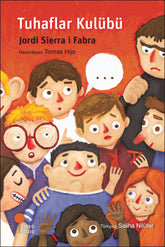P4C PHILOSOPHY WORKSHOPS WITH CHILDREN
WHAT IS P4C?
It is a pedagogy developed by American philosophy professor Matthew Lipman in the 1960s. Lipman observes that university students' reasoning skills are inadequate. He defines this pedagogical method as 'teaching to think'. Based on this awareness, Lipman initiates the Philosophy for Children (P4C) pedagogy.
P4C is an abbreviation for 'philosophy for children-communities'. The 4C expression also represents the four thinking skills targeted in the applications:
Critical
Creative
Collaborative
Caring thinking.
Philosophy for Children, a method for teaching and learning, enables thinking through questions and focuses on philosophical inquiry.
In P4C pedagogy, investigations are carried out with an 'inquiring community'. In the investigating community, the education expert is present as the 'Facilitator' and a stimulus in which a philosophical conflict is present is used. A section of a book, a picture, a film section or a news item that serves the concept to be investigated can be used as a stimulus.
P4C HISTORY
While developing this pedagogy, Prof. Matthew Lipman and one of his followers, Ann Sharp, base their work on the Socratic Dialogue method. In this method, it is assumed that the person in front of us does not know anything at first and they are made to think and question by asking questions. In the P4C method, a community of inquiry is created. During the investigation supported by guiding questions by the facilitator, children are directed to express their thoughts through questions and to listen to each other.
BENEFITS OF PHILOSOPHY WITH CHILDREN
• Critical, creative and careful thinking skills are developed.
• Reasoning about concepts
• While developing logical thinking, the ability to express one's own ideas freely within the framework of rational discussions develops.
• Being able to approach different opinions with equal distance,
• Questioning and argument development skills develop.
• Being able to recognize and object to logical errors,
• The ability to establish the relationship between philosophy and life develops.
HOW IS P4C IMPLEMENTED?
In P4C investigations, the education expert is called the facilitator. The facilitator is not the one who teaches information, but the one who helps children to reveal their own information. He/she does this by asking the 'right questions'. The facilitator does not control the investigation. He/she directs the children to ask questions, express their thoughts on the questions and listen to each other during the investigation.
In the investigations, no investigation is made into the lives or thoughts of philosophers. Only philosophical concepts are discussed. For example; concepts such as justice, freedom, happiness, good-evil, art, science, morality, etc. The facilitator presents a stimulus that contains a philosophical conflict (story, music, picture).
Children (ages 5-15) also learn to generate assumptions from a number of questions and develop new hypotheses through these stories. They also learn to form new thoughts by making inferences from their daily life experiences along with the concepts discussed.
CLICK FOR REGISTRATION FORM
*Please contact us for detailed information about the workshops and a trial lesson.
- Choosing a selection results in a full page refresh.



